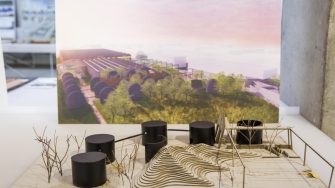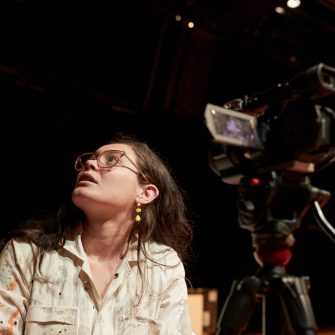Master of Landscape Architecture
- Commencing Terms
- Term 1 & 3
- Duration
- 3 Year(s)
- Delivery Mode
- Face-to-face (includes blended)
- Campus
-
Kensington
- Codes
- Program code 8136
- CRICOS code 094952G
-
2026 Indicative first year full fee
- $39,000*
-
2026 Indicative full fee to complete degree
- $123,000*
-
2026 Indicative first year full fee
- $49,000*
-
2026 Indicative full fee to complete degree
- $157,500*

Application closures for 2026
International applications for all undergraduate programs, as well as postgraduate programs offered by the faculties of Arts, Design & Architecture, Engineering (excluding Master of Information Technology and associated programs) and Science are now closed to New Overseas Student Commencement (NOSC) for 2026 intakes.
Postgraduate programs offered by the Business School and the faculties of Law & Justice and Medicine & Health remain open. Master of Information Technology (and associated programs) also remain open.
- Overview
- Entry requirements
- What will I study?
- Future careers
- How to apply
- Fees & Scholarships
Overview
The Master of Landscape Architecture at UNSW is a postgraduate degree that allows you to bring previous experience to launch a career shaping open spaces that benefit people and the planet.
As a Registered Landscape Architect, your professional practice will combine art and science to plan, design and manage landscapes that conserve and celebrate ecology and cultural values. You’ll be equipped to work with cities and communities around the world, designing open spaces in response to issues such as urbanisation, migration, sustainability and climate change.
UNSW’s is the longest established, accredited Landscape Architecture program in Australia. Through this studio-based degree, you’ll explore design principles, graphic techniques, ecological processes and human modification of the environment.
Key features
The key features and subject areas in this degree will see you explore landscape architecture through theory and practice, preparing you for diverse, future-focused careers. These include:
- Landscape technology
- Landscape systems & performance
- Advanced landscape theory & Research
- People, place and design
- Urban ecology and landscape design
- GIS and Urban Informatics
- Urban landscape and heritage
- Planting design at the landscape scale
Research project
In the sequence of Capstone studio courses, you’ll undertake an independent research-based design project, which allows you to deepen your expertise, adds to your professional portfolio, and empowers you to kick-start your career.
Why study at UNSW?
- We're ranked #1 in Sydney and #23 globally for architecture & built environment (QS World University Rankings by Subject, 2025)
- Benefit from studying the longest established, accredited Landscape Architecture program in Australia
- Become qualified to be a Registered Landscape Architect with the Australian Institute of Landscape Architects (AILA)
- Adobe Creative Cloud subscription included from the day you start your degree for the duration of your studies
- Increase your employability through an honours level outcome
- Benefit from strong industry links and partnerships
- Be supported by our diverse, interdisciplinary Arts, Design & Architecture community
- Learn through research-informed teaching
- Prioritise career success - UNSW has been awarded Most Employable students for six years in a row (Australian Financial Review (AFR) Top100 Future Leaders Awards, 2020–2025)
- Access world class alumni connections
- Join a global top 20 university (QS World University Rankings, 2024–2026)
- Join a community that’s part of the prestigious Group of Eight (Go8) universities
Want to see more from UNSW Arts, Design & Architecture?
Entry requirements
There are two different entry pathways to the Master of Landscape Architecture. The stream you apply for will depend on the depth of your prior experience, and how closely it relates to landscape architecture.
You may be eligible to have your study recognised via Recognition of Prior Learning (RPL). If your prior study is recognised, credit points can be counted towards the Master of Landscape Architecture, and you would then be able to complete the coursework undertaking fewer subjects.
For all streams, you will need to meet the following admission requirements to be considered for entry into the program:
- Have achieved a credit average (Weighted Average Mark 65+) in your bachelor’s degree
- Submit a portfolio*
- Provide a personal statement
Stream B - for students who have studied a closely related discipline
You apply for this stream if you studied an undergraduate degree in a discipline closely related to landscape architecture**. You can apply to have your study recognised via RPL. If your prior study is recognised, up to 48 units of credit (UOC) can be counted towards the Master of Landscape Architecture. You would then be able to complete the degree in two years, undertaking fewer subjects.
Stream C - for students who have completed a Bachelor of Landscape Architecture
You apply for this stream if you studied a four-year, accredited Bachelor of Landscape Architecture. You can apply to have your study recognised via RPL. If your prior study is recognised, up to 96 units of credit (UOC) can be counted towards the Master of Landscape Architecture. You would then be able to complete the degree in one year.
*Portfolio
Your portfolio needs to be submitted in a clear, digital format. It should include sample works from your previous experience and written explanations of all projects. Work from your previous degree may form part of the portfolio, but you need to clearly state what your role and contribution was. Other creative work can also be included.
**Related disciplines
Disciplines that are considered a ‘closely related discipline’ are:
- Architecture
- Urban design
- Urban planning
- Interior architecture
- Interior design
- Landscape design
English language requirements
You may be asked to provide evidence of your English proficiency to study at UNSW depending on your educational background and citizenship. English language skills are vitally important for coping with lectures, tutorials, assignments and examinations - this is why UNSW requires a minimum English language competency for enrolment.
If you’re completing an Australian Year 12 qualification (e.g. NSW HSC or equivalent), you do not need to provide anything extra to prove your proficiency. Your qualification will be used as evidence of your English proficiency.
If you do need to provide evidence of your English proficiency, this will be indicated in your application. You can prove this by providing evidence that you meet one or more of the following criteria:
- English language tests and university English courses
- Prior study in the medium of English
- Other qualifications
If you need to improve your English skills before you start your degree, UNSW College’s Academic English Programs are for you. The programs are suitable for various English levels and help you prepare for university studies and life in Australia.
For more details, visit the English Language Requirements page.
There are two different entry pathways to the Master of Landscape Architecture. The stream you apply for will depend on the depth of your prior experience, and how closely it relates to landscape architecture.
You may be eligible to have your study recognised via Recognition of Prior Learning (RPL). If your prior study is recognised, credit points can be counted towards the Master of Landscape Architecture, and you would then be able to complete the coursework undertaking fewer subjects.
For all streams, you will need to meet the following admission requirements to be considered for entry into the program:
- Have achieved a credit average (Weighted Average Mark 65+) in your bachelor’s degree
- Submit a portfolio*
- Provide a personal statement
Stream B - for students who have studied a closely related discipline
You apply for this stream if you studied an undergraduate degree in a discipline closely related to landscape architecture**. You can apply to have your study recognised via RPL. If your prior study is recognised, up to 48 units of credit (UOC) can be counted towards the Master of Landscape Architecture. You would then be able to complete the degree in two years, undertaking fewer subjects.
Stream C - for students who have completed a Bachelor of Landscape Architecture
You apply for this stream if you studied a four-year, accredited Bachelor of Landscape Architecture. You can apply to have your study recognised via RPL. If your prior study is recognised, up to 96 units of credit (UOC) can be counted towards the Master of Landscape Architecture. You would then be able to complete the degree in one year.
*Portfolio
Your portfolio needs to be submitted in a clear, digital format. It should include sample works from your previous experience and written explanations of all projects. Work from your previous degree may form part of the portfolio, but you need to clearly state what your role and contribution was. Other creative work can also be included.
**Related disciplines
Disciplines that are considered a ‘closely related discipline’ are:
- Architecture
- Urban design
- Urban planning
- Interior architecture
- Interior design
- Landscape design
English language requirements
You may be asked to provide evidence of your English proficiency to study at UNSW depending on whether you are from an English-speaking background or non-English speaking background. English language skills are vitally important for coping with lectures, tutorials, assignments and examinations - this is why UNSW requires a minimum English language competency for enrolment.
If English is not your first language, you’ll need to provide proof of your English proficiency before you can be given an offer to study at UNSW. You can do this by providing evidence that you meet one or more of the following criteria:
- English language tests and university English courses
- Prior study in the medium of English
- Other qualifications
If you need to improve your English skills before you start your degree, UNSW College’s Academic English Programs are for you. The programs are suitable for various English levels and help you prepare for university studies and life in Australia.
For more details, visit the English Language Requirements page.
Check the specific English language requirements for this program
What will I study?
UNSW is introducing a new academic calendar from 2028.
We are moving to a new flex-semester calendar. What does this mean for your studies?
Program structure
The Master of Landscape Architecture can be completed in one, two or three years full-time, depending on your educational experience and which stream of the program you study.
The number of, and which courses you study will also depend on your stream.
Full program structure
Each university year at UNSW has three terms and an optional summer study period. You can study full-time or part-time. Depending on how you plan your study load, you can fit two or three courses into a term and one course in a summer term.
Below is a summary of what you will study in each available stream of the program:
Stream B – for students who have studied a closely related discipline
Two years | 16 courses | 96 units of credit
- 8 Core Landscape Architecture courses
- 3 Elective courses from across the following areas of focus: Urban History and Theory, Urban Design and Planning, Communications and Visualisation, Social Agency and Equity, Performance: Environmental and Social
- 5 Landscape Studio courses
Stream C - for students who have completed a Bachelor of Landscape Architecture
One year | 8 courses | 96 units of credit
- 3 Core Landscape Architecture courses
- 2 Elective courses from across the following areas of focus: Urban History and Theory, Urban Design and Planning, Communications and Visualisation, Social Agency and Equity, Performance: Environmental and Social
- 3 Landscape Studio courses - these are practice based and related to your final independent research project, also known as your capstone project.
For full course listings, descriptions and timetables please see the UNSW Online Handbook.
Future careers
Landscape architecture is a design profession with a long tradition and increasing relevance as more cities, governments, organisations and communities work to create sustainable and beautiful environments in urban and rural settings.
Studying Landscape Architecture, you’ll gain a wide range of experience from design and visual communication, to plant knowledge, innovative materials and ground-breaking technologies, environmental legislation and landscape management, contracts, ethics and tendering. You’ll graduate with the knowledge, practical skills and confidence to go after and succeed in diverse careers with impact.
Potential careers
Registered Landscape Architect
Urban Landscape Designer
Artist
Landscape Project Officer and/or Manager
Recreation Manager
Urban Designer
Strategic Planner
Project Manager
Sustainability Specialist in government agencies
Academic
Heritage Consultant
Public Domain Manager
Environmental Manager
Accreditation
You will be eligible for professional accreditation with the Australian Institute of Landscape Architects.
How to apply
Applications must be submitted through our Apply Online portal. We encourage you to submit your completed application as early as possible to ensure it will be processed in time for your preferred term. Some high-demand programs and Faculties with limited places may have an earlier application deadline or commencement date. Find out more.
Ready to start your application?
For most international students, applications are submitted via our Apply Online service. We encourage you to submit your completed application as early as possible to ensure it will be processed in time for your preferred term.
Some high-demand programs with limited places, may have an earlier application deadline or may have an earlier commencement date. For details, visit the international admissions information page.
Ready to start your application?
Fees & Scholarships
*Fees are subject to annual review (or when required) by the University and may vary accordingly.
Indicative fees are a guide only and have been calculated based on the typical enrolment patterns of students undertaking the program. The indicative fees listed here is an estimate for tuition only and excludes non-tuition fees and charges. The amount you pay will vary depending on the calendar year of enrolment, the courses you select and whether your study load is more or less than 1 Equivalent Full Time Student Load (48 units of credit (UOC) per year).
You should not rely on indicative fees as fee increases are assessed when required and may exceed the indicative figures listed here. Actual fees are calculated on enrolment. More information on fees can be found at the UNSW fees website.
Commonwealth Study Assistance such as Ausstudy, and Youth Allowance is available for some Masters degrees. For the most up-to-date information and list of degrees visit UNSW Current Student Financial Support.
*Fees are subject to annual review by the University and may increase annually, with the new fees effective from the start of each calendar year. The indicative fees listed here are based on an estimated average and are for tuition only, other fees and charges are not included. The amount you pay will vary depending on the calendar year to enrol, the courses you select and whether your study load is more or less than 1 Equivalent Full Time Student Load (8 courses per year).
Indicative fees are a guide for comparison only based on current conditions and available data. You should not rely on indicative fees. More information on fees can be found at the UNSW fees website.
Indicative fees to complete the program have been calculated based on a percentage increase for every year of the program. Fee increases are assessed annually and may exceed the indicative figures listed here.
Indicative fees to complete the program include tuition plus an estimate of study-related costs of approximately $1,000 per year. To find out more about other costs, visit UNSW International.
Scholarships
At UNSW, we award over $83 million in scholarships each year. We pride ourselves on rewarding excellence and making university accessible to students from all walks of life. Whether you’re a domestic or international student, our range of scholarships, prizes and awards can support your journey.
Progress starts here – at a world-leading university

Top 20 Worldwide
Ranked in the global top 20 for three consecutive years
QS World University Rankings, 2024–2026

Winner of the AFR Most Employable University Award six years in a row
AFR Top100 Future Leaders Awards, 2020–2025

Australia's #1 for Innovation
Highest number of startups and spinouts from university-developed tech
SCOPR report, 2024




